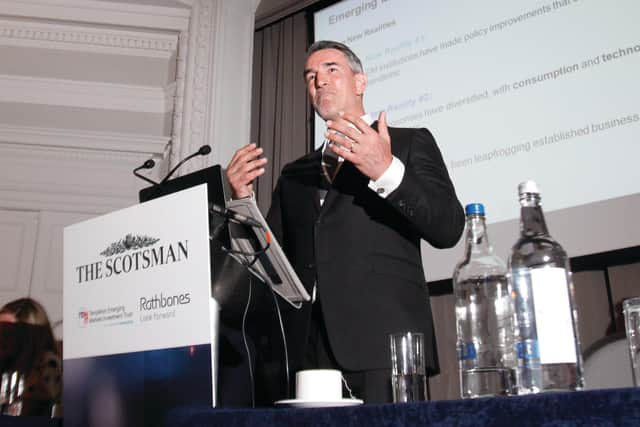Investment conference: Finding value further afield
Beyond the devastating human toll of Russia’s invasion of Ukraine, the impact includes further disruption to global supply chains already weakened by the pandemic.
As countries globally seek to improve security of food, energy and materials supplies, Brazil – among the world’s largest commodity exporters – is a key partner.
Advertisement
Hide AdAdvertisement
Hide AdIn the steel industry, Brazilian mining company Vale can help fill the void in iron ore imports as Ukrainian and Russian supplies are cut. Electrification and decarbonisation will drive demand – Vale is also a major miner of copper and the world’s largest producer of nickel, a key input in electric vehicles.


Agricultural commodity prices surged 18 per cent in the first two months of the year, driven by geopolitical uncertainty, adding to their 25 per cent gain in 2021. Brazil may have a competitive edge over other agricultural exporters as it generates 80 per cent of its electricity through renewable sources.
Resilient technology demand is a multi-year tailwind for EMs. The pandemic has given digitalisation a permanent uplift. The consumer internet industry has led the way in digital transformation so far, and we see industrial internet applications take off as manufacturers tap into new innovations to improve productivity.
The overall internet landscape across EMs remains dynamic and diverse. China has been a pioneer of new business models in e-commerce, online payment services that other countries have adopted and adapted.
Many internet businesses have also just started to list publicly in markets such as Southeast Asia and India. As a whole, internet businesses have become all pervasive yet still have significant scope for growth in EMs.
Semiconductors currently form the backbone of tech progress, and we expect continued demand strength, benefitting worldleading producers such as Samsung Electronics and Taiwan Semiconductor Manufacturing Corp.
Across EMs, cloud solutions are in a nascent stage of growth and we think there is great potential for their penetration rate to catch up with developed markets.
Technology plays a critical role in the pursuit of net-zero, another long-term growth trend. In Europe, the urgency of this has been reinforced by reliance upon Russian fossil fuel supplies.
Advertisement
Hide AdAdvertisement
Hide AdMany carbon-intensive companies anticipate higher carbon costs and are actively employing technology to cut their emissions. For instance, South Korean steel company Posco has developed artificial intelligence to monitor and optimise the operation of blast furnaces, which can pare its energy consumption.
We believe there can be investment opportunities in companies operating in high-emission yet essential industries that have the commitment and technological tools to decarbonise.
EMs have also been advancing their push for electrification and renewables. Electric vehicle (EV) adoption is accelerating, which supports our optimism toward firms in the EV value chain.
We are also positive on world-leading solar energy companies in EMs. Such companies represent the future and are essential to reducing reliance on fossil fuels – whether in response to climate change or war in Europe.
An important feature we seek in EMs is resilience, in terms of both their economies and companies.
What especially matters to us is the sustainability of company earnings, whether in the face of seismic shifts in geopolitics, the Covid-19 pandemic, technology disruption or other challenges.
We see companies with structural growth drivers aligned with digitalisation, decarbonisation and other transformative trends emerging as long-term winners, which should underpin EM equities ahead.
- Andrew Ness is portfolio manager at Templeton Emerging Markets Investment Trust.
A message from the Editor:
Advertisement
Hide AdAdvertisement
Hide AdThank you for reading this article. We're more reliant on your support than ever as the shift in consumer habits brought about by Coronavirus impacts our advertisers.
If you haven't already, please consider supporting our trusted, fact-checked journalism by taking out a digital subscription.
